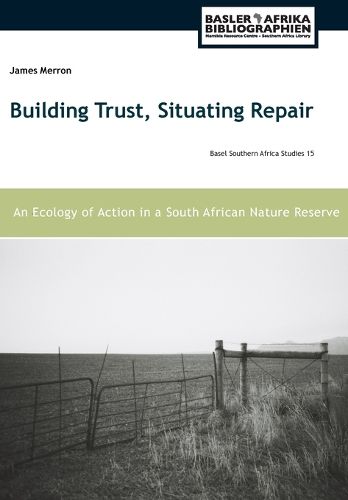Readings Newsletter
Become a Readings Member to make your shopping experience even easier.
Sign in or sign up for free!
You’re not far away from qualifying for FREE standard shipping within Australia
You’ve qualified for FREE standard shipping within Australia
The cart is loading…






This title is printed to order. This book may have been self-published. If so, we cannot guarantee the quality of the content. In the main most books will have gone through the editing process however some may not. We therefore suggest that you be aware of this before ordering this book. If in doubt check either the author or publisher’s details as we are unable to accept any returns unless they are faulty. Please contact us if you have any questions.
Nature conservation is often framed as an ecological problem in need of repair. With both material and discursive dimensions, repairing things involves repairing people's orientation to those things. As such, nature conservation can be understood as a negotiation between different orientations to ecological problems.
This publication seeks to understand the negotiation through trust, the analysis of which situates repair in a particular setting. Empirically, the book is structured around an encounter that unfolded over the course of a single day between white commercial farmers and experts belonging to various government departments, universities and an NGO working in a South African nature reserve. By moving through the situation se-quence-by-sequence the author captures the relationship between trust and repair vis-a-vis the material forces that structured the situation, and the discursive methods that actors used to repair a degraded ecology.
Originally from Makhanda (South Africa), James Merron grew up in Botswana and the United States. After his Master's degree, he lectured at Stellenbosch University in 2012. By 2023, he earned a PhD and then post-doc position at the University of Basel. He is associated with the Centre for African Studies Basel (Switzerland) and his work is based on exploring the relationship between science, technology and society.
$9.00 standard shipping within Australia
FREE standard shipping within Australia for orders over $100.00
Express & International shipping calculated at checkout
This title is printed to order. This book may have been self-published. If so, we cannot guarantee the quality of the content. In the main most books will have gone through the editing process however some may not. We therefore suggest that you be aware of this before ordering this book. If in doubt check either the author or publisher’s details as we are unable to accept any returns unless they are faulty. Please contact us if you have any questions.
Nature conservation is often framed as an ecological problem in need of repair. With both material and discursive dimensions, repairing things involves repairing people's orientation to those things. As such, nature conservation can be understood as a negotiation between different orientations to ecological problems.
This publication seeks to understand the negotiation through trust, the analysis of which situates repair in a particular setting. Empirically, the book is structured around an encounter that unfolded over the course of a single day between white commercial farmers and experts belonging to various government departments, universities and an NGO working in a South African nature reserve. By moving through the situation se-quence-by-sequence the author captures the relationship between trust and repair vis-a-vis the material forces that structured the situation, and the discursive methods that actors used to repair a degraded ecology.
Originally from Makhanda (South Africa), James Merron grew up in Botswana and the United States. After his Master's degree, he lectured at Stellenbosch University in 2012. By 2023, he earned a PhD and then post-doc position at the University of Basel. He is associated with the Centre for African Studies Basel (Switzerland) and his work is based on exploring the relationship between science, technology and society.